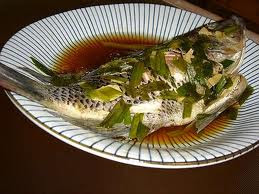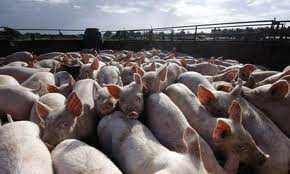Fish is an aquatic animal.They serves as food as well as a good protein source for man and other industrial purposes. There various species of fishes living in the water bodies. Man in his bid to survive has deviced a varieties of techniques to be used in catching fish in order to satisfy hunger.
 |
| A delicacy of Tilapia fish mostly consumed in Southern Nigeria |
 |
| A special delicacy of tilapia fish with vegetable, red oil and pepper |
Recreational fishing is for pleasure. Commercial fishing is for profit making and artisanal fishing for survival. Traditional fishing uses traditional techniques such as hooks and small fishing nets. Traditional fishing involves small commercial business using rod, harpoons, tackle, etc. It has certain convention, rules, licensing restriction and laws in Nigeria.
Common form of recreational fishing uses rod, spool, line, hooks. Big game fishing is another form of fishing. It describes fishing from boat catching large open water species.
Fishermen use a term, fishing tackle. Equipment or gear used for fishing is fishing tackle. Hooks, lines, sinkers, floats, rods, reels, etc are some examples of fishing tackles. Fishing for money is quiet dangerous. Sometimes people can die when they need to go far in the ocean. Fishing provides food to many countries. Aquaculture and Mari culture add to catching fish freely.
Fishing industry involves taking, culturing, processing, marketing and selling. Commercial activity aims at delivering for human consumption and the raw use of industrial process.
Three principal sectors are there
(1) Commercial sector
(2) Traditional Sector
(3) Recreational Sector.
Commercial sector related to aquaculture resources and transformation of those resources in to products for sale and consumption. Traditional sector related to fisheries resources from which aboriginal people derive traditional products. Recreational resources associated with recreation with fisheries resources. Products derived are not for sale.
Commercial fishing is mainly for commercial purposes. Commercial fishermen harvest almost all aquatic species like tuna, cod, salmon, lobster, squid, crab. Commercial fishing involves weights, nets, hooks, lift nets, gill nets, entangling nets and traps. Top fish producing countries are China, Japan, USA, Russia, India, Thailand. Small number of fisheries supports bulk of world fisheries. They are herring, cod, tuna, flounder, mullet, salmon, crab, lobster, etc.
Fish farming is another primary form of aqua culture. It involves raising fish in tanks or enclosures for food. Fish species like Atlantic salmon, carp, Tilapia, catfish, trout raised by fish farms. Demands on wild fisheries caused overfishing. Fish as well fish products are popular all over the world. Fish and other aquatic organisms are used in food and other products.
Fisheries management draws on fisheries resources for protecting fishery resources. Modern fisheries management is often referred to governmental system of management rules based on defined purposes. Long-term sustainability of fishing includes overfishing, marine pollution, climate change and fish farming. Sustainability can be maintained by limiting fishing operations. Fishing provides not only food and work but also cultural identity and community.
Your boat is a major investment and having a perfect fitting Boat cover is the most important thing for the life of your boat. Check out these Boat Covers, available in a wide variety of shapes, sizes, colors and materials. Boat covers, Boat Tops that last.
Contact Ekwu Farms and Agribusiness now for management counselling on Fish Farming, Poultry Farming, Piggery Farming, Ruminants Production, Cattle Farming, Sheep Farming and Goat Farming,Ginea Pig farming, Rabbit Farming, Snail Farming, Bee Keeping (Apiculture), Mushroom Production, Vegetable Crop Farming, Cash and Feed Milling and Formulation, Food and Cash Crop Farming and Marketing. You can email us or call +234 8068101114 and +2348051542333. You 're welcome.














